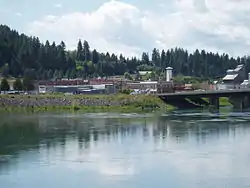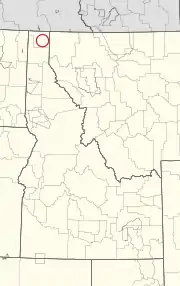Kootenai Tribe of Idaho
The Kootenai Tribe of Idaho (Kutenai language: ʔaq̓anqmi[3]) is a federally recognized tribe of Lower Kootenai people, sometimes called the Idaho Ksanka. The Ktunaxa (English: /tʌˈnɑːhɑː/ tun-AH-hah;[4] Kutenai pron. [ktunʌ́χɑ̝]), also known as Kutenai (English: /ˈkuːtəneɪ, -tneɪ, -ni/), Kootenay (predominant spelling in Canada) and Kootenai (predominant spelling in the United States) are an Indigenous people of the Northwest Plateau.[5]
ʔaq̓anqmi | |
|---|---|
 Bonners Ferry on the Kootenai River | |
| Total population | |
| 165[1] | |
| Regions with significant populations | |
| Languages | |
| Kutenai, English[2] | |
| Religion | |
| traditional tribal religion, Sun Dance religion | |
| Related ethnic groups | |
| other Kootenai people, Flatheads, Kalispel people[1] |
They are one of five federally recognized tribes in the state of Idaho. The others are Coeur d'Alene, Nez Perce, Shoshone-Bannock, and Duck Valley Indian Reservation (Western Shoshone-Northern Paiute).
Reservation

The Kootenai Reservation was first established in 1896. After subsequent land loss, the reservation was re-established in 1974.[6] The reservation is 2,695 acres (4.2 sq mi; 10.9 km2) in Boundary County, along U.S. Route 95.[1]
Government
The tribe's headquarters is in Bonners Ferry, Idaho. The tribe is governed by a democratically elected, nine-member tribal council. The current administration is as follows:
Language
Traditionally, Kootenai people have spoken the Kutenai language, a language isolate. It has a dictionary and grammar and is written in the Latin script.[2]
History
The Kootenai people lived along the Kootenai River in Idaho, Montana, and British Columbia. They were hunter-gatherers, and salmon was an important staple to their diets. They have permanent winter villages of cone-shaped houses made from wooden poles and rush mats.[1]
In 1855 the tribe refused to sign a treaty with the US government that would require them to cede their aboriginal lands in Idaho and consolidate with several other smaller tribes in Montana. The Dawes Act broke up tribal land holdings into individual allotments.[1] Due to illegal land loss, the tribe was awarded $425,000 in a land claims settlement in 1960.[6]
On September 20, 1974, the 67 members of the Kootenai Tribe formally declared war on the United States, seeking federal recognition.[9][10][11][12] Initial demands were for a 128,000-acre (200 sq mi; 520 km2) reservation and compensation for 1,600,000 acres (2,500 sq mi; 6,470 km2) of ancestral lands.[13] They did not engage in violence, and, by calling attention to their situation, the tribe was deeded 12.5 acres (5.1 ha) of federal land surrounding the former mission in Bonners Ferry.[1][14] It was enacted by S. 634, signed by President Gerald Ford in October.[15]
Economic development
Since 1986, the Kootenai Tribe has owned and operated the Kootenai River Inn in Bonners Ferry. It is now the Kootenai River Inn Casino and Spa, also has the Springs Restaurant, Casino Deli, the Kootenai Day Spa, and gift shop.[1][16]
Reservation industries include timber, tourism, and selling sand and gravel. The tribe also owns a sturgeon hatchery.[1]
Notes
- "Kootenai Tribe." Archived 2013-04-26 at the Wayback Machine Northwest Portland Area Indian Health Board. Retrieved 31 July 2013.
- "Kutenai." Ethnologue. Retrieved 31 July 2013.
- First Voices - Ktunaxa Home Page - About Us www.firstvoices.com/explore/FV/sections/Data/Ktunaxa/Ktunaxa/Ktunaxa
- "Pronunciation Guide to First Nations in British Columbia". Aboriginal Affairs and Northern Development Canada. 2010-09-15. Archived from the original on 2014-01-23. Retrieved 2013-05-14.
- Pritzker 263
- Pritzker 262
- "Tribal Directory." National Congress of American Indians. Retrieved 31 July 2013.
- "Government." Kootenai Tribe of Idaho. Retrieved December 12, 2013.
- "Kootenai Indians mobilizing for war". The Bulletin. (Bend, Oregon). Associated Press. September 18, 1974. p. A8.
- Dullenty, Jim (September 20, 1974). "U.S. sending peacemaker to north Idaho Indian war". Spokane Daily Chronicle. (Washington). p. 1.
- "Kootenai open 'war' on U.S." The Bulletin. (Bend, Oregon). Associated Press. September 20, 1974. p. 1.
- "Indians, officials talking of peace". Spokane Daily Chronicle. (Washington). Associated Press. September 21, 1974. p. 7.
- "Kootenais threaten". Spokane Daily Chronicle. (Washington). Associated Press. September 23, 1974. p. 5.
- Taylor, Kevin (September 19, 2004). "Fight for a future". Spokesman-Review. (Spokane, Washington). p. 1A.
- "S. 634, Kootenai Indian Trust Land, Idaho" (PDF). Gerald R. Ford Presidential Library & Museum. (press release). October 19, 1974. Retrieved June 20, 2018.
- "Kootenai River Inn Casino & Spa." 500 Nations. Retrieved 31 July 2013.
References
- Pritzker, Barry M. A Native American Encyclopedia: History, Culture, and Peoples. Oxford: Oxford University Press, 2000. ISBN 978-0-19-513877-1.
External links
- Kootenai Tribe of Idaho Archived 2006-10-29 at the Wayback Machine, official website
- "The Kootenai Tribe’s Forgotten War," Archived 2015-03-09 at the Wayback Machine by Jack McNeel, Idaho Public Television
- Kutenai Tales, a 1918 book by anthropologist Franz Boas